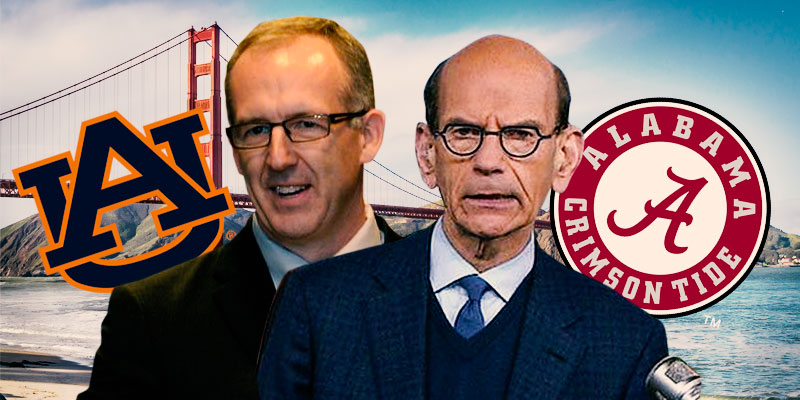It took 40 years in the media business, but Paul Finebaum finally said something smart earlier this week.
Appearing on ESPN’s “Get Up,” Finebaum said putting together the upcoming college football season would be “survival of the fittest.” He continued, “This is a brutal game … if you can play, you play. If you don’t, you get run over and left behind.”
In the same conversation, Finebaum reported that the Crimson Tide has already had conversations about replacing its opening opponent, USC, with TCU. TCU is scheduled to play another Golden State school, Cal-Berkeley, on September 5.
Many areas in the state of California, home to four Pac-12 teams, have stay-at-home orders in place through the summer. Its state university system has declared there will not be any on-campus classes during the Fall semester. As a result, some believe the Pac-12 will not play football this Fall and instead opt for a Spring season.
Similar problems could pop up in other conferences. Big Ten states such as Michigan, Illinois and New Jersey have extended their stay-at-home orders.
Every conference is facing different situations which are being dictated by political leadership in their member states.
This is why Greg Byrne, Alabama’s athletic director, and his team are reportedly undertaking prudent steps to ensure they do not get left behind. Byrne has said the Crimson Tide are playing games this year — and has even started inviting guests. At Auburn, President Jay Gogue has told students they are “going to have football this fall.”
If a team cannot play because of circumstances at home, then so be it. As Finebaum said, “If you can play, you play. If you don’t, you get run over and left behind.”
What happens in Michigan, Illinois, New Jersey and California should not decide whether schools in the South play football this season.
That is not, however, the stated position of the SEC office.
SEC Commissioner Greg Sankey took to the airwaves on Tuesday seeking to quash any notion that his conference would make decisions separate and apart from those in other regions of the country.
“The notion that one thinks one conference is going to go off and doing something independently isn’t attached to reality,” Sankey told Finebaum.
The reality is California schools have already begun to make decisions affecting the season, and it does not seem they are asking the SEC for input.
There are a lot of reasons why the SEC should be actively forging its own path.
First, there is a long time between now and opening weekend. Only two months ago, COVID-19 projections for Alabama were through the roof. Those projections have not come to fruition. Governor Kay Ivey held true to her word and reopened the state for business. The states of Georgia and Florida have reopened and seen their numbers decline.
Maybe the data in Georgia and Florida has to do with a second reason to go it alone, if necessary: SEC weather. A human being can barely survive an 11:00 a.m. kickoff in Starkville, so what makes anyone think a virus can?
The reality is SEC football fans like to dream. Right this minute, Georgia fans are dreaming of a national championship, Kentucky fans are dreaming of basketball season, and South Carolina fans are dreaming of Dabo Swinney’s move to Tuscaloosa.
If other schools and conferences decide not play this year, schedules will have to be patched together as best as they can. No doubt. But for Sankey to duct tape Bama, Auburn and every other SEC school to the political whims of California makes no sense.
Sankey has extended the “We’re all in this together” mantra a little too far. When it comes to college football, we are most definitely not all in this together.
Tim Howe is an owner of Yellowhammer Multimedia













